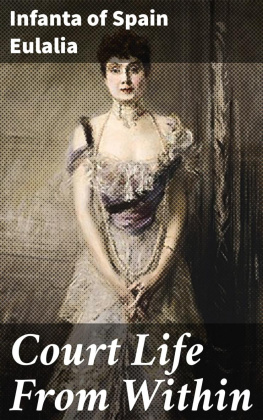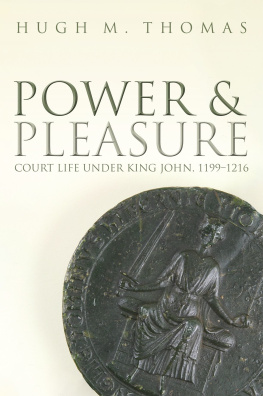(In certain versions of this etext [in certain browsers] clicking on the image will bring up a larger version.)
(etext transcriber's note) |
H. R. H., the Infanta Eulalia
Photograph by Henrie Manuel, Paris
COURT LIFE
FROM WITHIN
BY
H. R. H.
THE INFANTA EULALIA
OF SPAIN
The time has come, the Walrus said,
To talk of many things,
Of shoes and ships and sealing-wax,
Of cabbages and kings.
ILLUSTRATED
NEW YORK
DODD, MEAD AND COMPANY
1915
Copyright , 1913, 1914
By THE BUTTERICK PUBLISHING CO.
Copyright , 1914
By THE CENTURY CO.
Copyright , 1915
By DODD, MEAD & COMPANY
INTRODUCTION
I have endeavoured in these pages to present a true picture of Court life. It is a life hedged about by many restrictions; to me a great deal of it all was empty and meaningless.
I say nothing of those who are actively engaged in the duties of rulership; but to the other members of Royal families, life is little more than a round of useless ceremonies, from which a mind with any pretence to independence flies in reliefdoes opportunity offer. I have left behind me the life of Courts and palaces. But for many years, in my own youth, and while my sons were growing up into manhood, I fulfilled my part as a Princess of Spain, after my marriage visiting practically all the Courts of Europe. I have written here of these visits and of my impressions of the rulers of Europe, and, while I hope there is much in this book of kindliness and sympathy, yet I have considered truth to be the first essential in these recollections.
I am democratic in my sympathies, and consider the day has gone by when Royalty should live behind closed blinds. The world, as I see it, is peopled by one big family. We are all brothers and sisters; let us know one another better.
Paris, 1915.
COURT LIFE FROM WITHIN
CHAPTER I
THE SEEDS OF REVOLT
The time has come, the Walrus said,
To talk of many things,
Of shoes and ships and sealing-wax,
Of cabbages and kings.
Alice in Wonderland.
Once , when I was making an official visit to the South of Spain with my brother (who was then King), we were told of a gentleman of the Province of Sevilla who had had a talking parrot sent to him from South America; and this parrot had been taught to say Viva la Reina!that is, Long live the Queen! But soon after its arrival in Sevilla there was a revolution, and Spain became a republic; and it was not at all comfortable for the gentleman to have a parrot screaming Long live the Queen! So he shut it up in a room in his house and set himself to teach it to cry Viva la Republica!Long live the Republic! It was a very intelligent parrot, and he easily taught it to say Viva la Republica!; but it had a tenacious memory, and it took him a long time before he could be sure that it would always say Viva la Republica! and never forget its change of politics and cry out, inopportunely, in a voice to be heard by the neighbours, Viva la Reina! Then there was another revolution, and Spain became a monarchy again, and every one shouted Viva el Rey!Long live the King! And the gentleman carried his parrot back to the closed room, and after many days spent in trying to teach it to cry Viva el Rey! he wrung its neck.
It was a very valuable parrot, and most intelligent, but it was not sufficiently facile to take a speaking part in Spanish politics in those days.
I have remembered this sad story of the parrot because the events of its life were so important to my own. The Queen whom it first supported was my mother, Isabella II. The King on whose account it lost its life was my brother, Alfonso XII. And the Republic (which lasted from 1868 to 1874) was the one that made it possible for me to escape, at least mentally and spiritually, from the prisonvery gilded, very luxurious, but more guarded than a Bastillein which Royalty is compelled to live. Such an escape, I think, is more difficult than any of Baron Trencks. It is one that leaves, as you might say, the impediment of fetters on the mind, even when the body has gone free. And I have long been curious to consider what it was in me that made me struggle out of this splendid confinement, in which one is so envied and so many are so content.
When the revolution of 68 first disturbed my lifeand the parrotsI was too young to know it. The intelligence was still unformed, the body infantile. But both the body and the mind had been born of a race so old and in traditions so established that it would seem no revolution could affect them. For many hundreds of years a few families of human beings had been inheriting the thrones of Europe, generation after generation, as families inherit property, from parents to children, by the consent of society and under the protection of law. They were by birth Royal, as persons may be, in democracies, by birth wealthy. And they were born to rule as unquestionably as the children of the poor to-day are born to poverty. They were spoken of as Blood Royal, as if they were of special flesh, and they intermarried only with Blood Royal, because the people whom they governed demanded children of this special flesh to sit on the thrones of their countries. A king here or a queen there might lose a crown by bad management, or misfortune, or the ill-will of subjects, as a man might lose an inherited estate by similar causes; but he could not lose his place among the families of Royalty (with whom he and his children had intermarried) nor the honours of Courts and the respect of peoples who still obeyed members of the ruling families into which he had been born. So, since I had been born into one of these familiesthe Bourbonthe essentials of my life were as little changed by the revolution of 68 as the parrots were. We both remained in our cages.
My mother, leaving Spain, came to Paris, to live in the Palais de Castile with her children, a Queen in exile, but still a Queen; Napoleon III. extended the hospitality of the nation to her; and she continued to move among ceremonies and Court functions after the manner royal.
Of all this I recall almost nothing. I have a vague memory of Napoleon III. making us a visit, and I remember that the young Prince Napoleon came to play with my brother and my sisters, who were older than I. I can recall our flight from Paris, when it was about to be besieged by the Prussians, for I was ill with measles and I was carried downstairs wrapped in a blanket, and I saw, somewhere on our journey to Normandy, German soldiers with helmets as our carriage passed them. But these are recollections of the eyes alone; they mean nothing.
My first clear consciousness of myself I cannot place. It pictures me in rebellion against wearing the earrings for which my ears had been pierced soon after my birth, so that I might be decorated with the jewels that were part of the regalia in which a Princess of Spain was expected to appear, even as an infant. I do not know why I rebelledunless it was because the earrings interfered with the bodily activity that was irrepressible in me. I was very healthy, very strong. I wished to play outdoors, where I could run; I chafed at the restraint of our formal living; and I think it was this revolt of the body that became a revolt of the mind as soon as I developed a mind.
Conceive that we children had no playroom in the Palais. We had to amuse ourselves in a decorous sitting-room, quietly. And we were never allowed to be alone. We were always under the eyes of some Spanish lady-in-waiting who guarded and repressed us. When we were taken for a walk in the Bois, we were accompanied by ladies who prevented us from playing with the children we met. At home some one always sat and observed what we were doing. At night some one watched and slept in the bedroom with us. Whatever we did there were eyes on us. It is true that until after I was married I was scarcely left alone for a moment to sit by myself in a room. That seems to me very sad.






